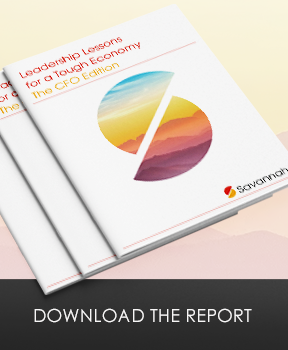Leadership Lessons for a Tough Economy: The CFO Edition
INTRODUCTION

In the grip of a global economic slowdown, the Chief Financial Officer holds one of, if not the most critical role in any organisation. In the light of the inevitable pressures facing finance leaders, Savannah has analysed a global sample of more than 500 CFOs to identify trends and considerations for CEOs, CFOs, Boards and investors preparing themselves for what the Organisation for Economic Co-operation and Development (OECD) predicts as severe economic headwinds in 2023.
Using Savannah’s proprietary technology, MapX, we identified over 500 CFOs from across the FTSE 100 and 250, S&P 100 and EuroStocks, in addition to private (including PE-backed) companies. Data including demographics, career history, functional experience was then examined to identify trends from the sample. This research was conducted in Q4 2022, and was incorporated into a predictive model allowing us to estimate the data for the outstanding two months. We examined how the career paths and experiences of CFOs has changed over time and in relation to the trends and changes in the global economy. We combined insights drawn from MapX data with commentary from Savannah’s finance experts who have over 50 years of combined experience working with organisations to identify and place finance leaders.
PREPARING FOR INCREASED CHURN
Savannah’s analysis reveals clear spikes in churn among CFOs during previous periods of economic difficulty, notably the recession of 2008, the stock market crash of 2011, and a further slowdown in 2014. Our sample covered 44 changes of CFO at the time of the 2008 crash, with the most-affected industries being retail/consumer and energy/ utilities. Our research also uncovered a decline in churn of CFOs during the Covid-19 pandemic. We suggest that this is down to the need for stability, the avoidance of creating more uncertainty and a sense of loyalty between CEO and CFO. Anecdotally, we began to see signs of an increase in churn in 2022 and anticipate this to rise yet further in 2023, potentially not reaching the same level as 2008 and 2011 due to an improvement in internal succession plans and more emphasis on longer-term remuneration and associated performance.
MORE INTERNAL HIRING; LITTLE CHANGE IN DIVERSITY
Our data shows a trend in recent years towards appointing CFOs internally. Our analysis of more than 500 CFO appointments found that internal hires (74 since 2016) have outnumbered external hires (57) in each of the last four years.
“There are more people being promoted internally because companies are getting better at planning for succession,” says Richard Ashton, Head of Financial Officers Practice at Savannah Group. There are a number of reasons for this: better functioning Boards with improved Audit Chair capability; improved development and succession planning – a Board or PE sponsor knows what they are getting; ambitious candidates taking control of their development and career planning and pushing for more developmental responsibility and face time with key decision makers.
“There are more people being promoted internally because companies are getting much better at planning for succession.” Richard Ashton
Our data shows a trend in recent years towards appointing CFOs internally. Our analysis of more than 500 CFO appointments found that internal hires (74 since 2016) have outnumbered external hires (57) in each of the last four years.
“It can be hard for a number two Group Financial Controller or Divisional CFO to step up – it’s a perception thing,” says Ashton. “Often we will map the external candidate population against internal options – when organizations run due process and the internal candidate is chosen objectively, they are more likely to be accepted as CFO – both internally and externally.”
Planned leadership transitions bring many benefits such as continuity and deep understanding of the business and its’ challenges. The flip side of internal hiring can be missing opportunities to add diversity with its associated benefits of innovation, creativity and broader experience of tangential sectors and organizational challenges. Just 15% of the CFOs in our sample are women, a ratio largely unchanged in the last decade.
ADAPTING FINANCE LEADERSHIP ACCORDING TO CONTEXT
“A CFO has to know the numbers… But they also need vision of what they need to keep, what they need to get rid of and what they need to change.” Hervé Sodatonou
In turbulent times, transformation can be necessary to pivot the finance function, preserve value, take opportunities and minimise losses. In these scenarios, a CFO must combine sound technical skills with creative vision, says Hervé Sodatonou, Savannah Group Partner. “Clearly the CFO must know the numbers,” he says. “But they also need vision of what they need to keep, what they need to get rid of and what they need to change.”
Interim finance leadership appointments can be particularly relevant when organisations are facing challenging times. They can solve immediate transformational and operational issues, drive the organization through a merger or acquisition, review controls, volatile currencies or hedging on investments says Mike Faull, Partner, Interim Financial Officers Practice.
“They can provide breathing room for assessment of potential succession candidates. They can have a wealth of experience related to a specific current problem that may well reverse in time, for example climbing interest rates or supply chain issues.”
Although an economic downturn does not mean that all companies are suffering, Faull points out. Some sectors are thriving, and CFOs are being hired to be expansive and find opportunities. “It is not always a negative story,” he says. “This year has almost exclusively been about finding commercially focused Finance Directors searching for opportunities. There is a special set of CFOs adept at creating value.”
“…Interim finance leadership appointments can be particularly relevant when organisations are facing challenging times.” Mike Faull
The right finance leadership is dependent on specific organisational characteristics.
For example, in the world of private equity (PE), the CFO faces a different set of challenges in this economic climate. The effects of the pandemic might mean that PE houses are “two years behind” in their planning cycles, which puts added pressure on the CFO, says Joe Rudkin, Principal, Financial Officers Practice. “They are expected to deliver results quicker.”
PE is investing heavily in gaming and other sectors where companies thrived during the pandemic but are often less mature in business terms. “It means CFOs are going to have to be far better at entrepreneur management and working with ideas people who want PE investment but don’t necessarily understand the territory that comes with it,” says Rudkin.
This could mean greater involvement in due diligence and strategic planning than would be required from a CFO at a Plc, he argues. There can be less opportunity for flexible working in PE roles. “You don’t get many turn-the-wheel private equity assignments; they tend to be all-hands-on-deck.”
“…CFOs are going to have to be far better at entrepreneur management and working with ideas people…” Joe Rudkin
HIGH VERSUS LOW RISK HIRING
Our research demonstrates the decrease in risk appetite when it comes to recruiting a new CFO. This can be partly explained by a mixture of an improved Executive Search offering supported by technology and better succession planning meaning less reactive recruitment.
Richard Ashton feels as though a decrease in risk appetite also means a smaller pool of perceived qualified candidates and increased competition for talent.
“Clients seem more willing to take on a first time CFO if they understand either the sector of future strategic direction” Richard Ashton
“With better career development, potential CFOs are filing in the experience gaps much more sensibly meaning that they are better qualified to take on the CFO position while unproven.” He goes on to say that “Clients seem more willing to take on a first time CFO if they understand either the sector or future strategic direction (expansion, transformation etc).” Our research tells us that a new CFO is just as likely to have prior CFO experience in a relevant sector as they are to either lack sector relevance or prior CFO credentials.
“This could indicate that a Board or PE sponsor is looking at factors such as cultural fit and business situation over and above simplistic measures such as sectoral experience.”
CFOS ARE MORPHING INTO CEOS
“If we look at what a CFO role was in 2008 and compare it to the job now it is fundamentally different and much more about running the business rather than running the numbers,” Katrina Cheverton, CEO of Savannah Group and a former CFO. Today’s CFO cannot work in a silo as an “expert in counting beans” but must be “intrinsically interested in how the business works and succeeds”, she says. They are expected to take on a much “broader role” that requires aptitude for risk management and to have commercial experience of taking responsibility for the P&L. “People no longer see the CFO as being the numbers person, they see them as being the answers person.”
“If we look at what a CFO role was in 2008 and compare it to the job now it is fundamentally different and much more about running the business rather than running the numbers.” Katrina Cheverton
Reflecting this increasing need for breadth of experience, we found that just 29% of CFOs had stayed within the same sector for their entire career. CFOs working in the Business Services, Engineering and Technology sectors were the most mobile in switching to other parts of the economy, while CFOs within Financial Services where the least mobile. From our research 46% of CFOs have stayed in the same sector since 2008 with just 21% of CFOs within Financial Services spending time outside of the sector.
To find such candidates, Cheverton says companies must understand and prioritise the need for diversity within their recruitment strategy. “It is vital to look for people who have done different things and had different experiences and occupied roles which are not finance roles, whether you are promoting internally or hiring externally. You need to think creatively to find them, be that across geographies or tangential sectors.”
And competition for great CFOs is fierce. CFOs are often first in line for the roles of CEO or Chair. “The natural skill sets that you would associate with a CEO, you can associate with a CFO,” says Hazel Lawrie, Principal, Financial Officers Practice. The battle for talent is intense. “There is always very high competition particularly in FTSE companies for people with a strong track record; companies are looking for fewer, better people,” says Lawrie.
Today’s CFO must have a wider range of talents than ever. In the face of a quick to change and tough economy, Richard Ashton suggests that there are three key ways that a company can set themselves up for a successful CFO transition:
- Careful and transparent succession planning.
- Increased appetite for calculated risk.
- Upfront agreement on what the organisation actually needs in a CFO.
“The natural skill sets that you would associate with a CEO, now you associate with a CFO.” Hazel Lawrie




